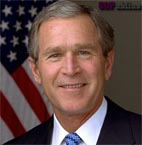Middle East is now more ''freer and more hopeful'': Bush
 Washington, Dec. 6 : US President George W Bush has told the Brookings Institution''s Saban Center for Middle East Policy that the Middle East is now "freer and more hopeful" than it was when he took office in 2000.
Washington, Dec. 6 : US President George W Bush has told the Brookings Institution''s Saban Center for Middle East Policy that the Middle East is now "freer and more hopeful" than it was when he took office in 2000.
"We see it in women taking their seats in elected parliaments, and bloggers telling the world their dreams. We see it in skyscrapers rising above Abu Dhabi, and thriving Middle Eastern businesses connected to the global economy. And we see it in a Saudi king sponsoring an interfaith dialogue, Palestinian reformers fighting corruption and terror, and Israelis who love their ancient land, but want to live in peace," the Washington Times quoted Bush, as saying.
"The Middle East is closing a chapter of darkness and fear, and opening a new one written in the language of possibility and hope," he added.
He also admitted to shortcomings in his Middle East policy.
"In some areas we have fallen short of our hopes," he says according to a text of the speech released by the White House.
"For example, the fight in Iraq has been longer and more costly than expected. The reluctance of entrenched regimes to open their political systems has been disappointing. And there have been unfortunate setbacks at key points in the peace process – including the illness suffered by Prime Minister Sharon, the Hamas victory in the Palestinian elections, and the terrorist takeover of Gaza," he said.
Bush’s optimism was however met by skepticism from at least some in the audience.
Martin S. Indyk, the Saban Center''s director and a former ambassador to Israel under President Clinton, said: “For almost a decade, the United States has done little to address the region''s principal conflicts and concerns and instead has opened the way for Iran to make a bid for hegemony inn the Arab heartland.”
“In the process, the United States has developed a reputation for arrogance and double standards," Indyk added.
"The net effect is an impression left by the Bush administration that the United States is unable to deliver, and that when it tries, it tends to make matters worse. In so doing, the administration has raised serious doubts about American competence and intentions," Indyk and Richard Haass write in an essay titled "Restoring the Balance: A Middle East Strategy for the Next President."
The two men argue that Bush showed a "willful disregard of the Palestinian issue for most of its two terms," that his "mishandling of Iraq and Afghanistan opened the door to an Iranian bid for regional primacy by removing Tehran''s most threatening enemies," and that his "insistence on elections in Iraq, Lebanon and the Palestinian territories enabled Islamist parties with militias to enter the political process and then paralyze it in each place." (ANI)